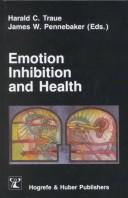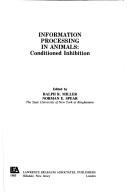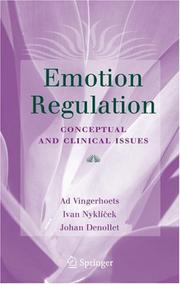| Listing 1 - 9 of 9 |
Sort by
|
Book
ISBN: 2225806411 9782225806414 Year: 1986 Publisher: Paris: Masson,
Abstract | Keywords | Export | Availability | Bookmark
 Loading...
Loading...Choose an application
- Reference Manager
- EndNote
- RefWorks (Direct export to RefWorks)
Psychophysiology --- Inhibition (Psychology) --- Biological control systems --- Psychology, Pathological --- Human behavior
Book
ISSN: 12644854 ISBN: 9782130587774 2130587771 Year: 2012 Publisher: Paris: PUF,
Abstract | Keywords | Export | Availability | Bookmark
 Loading...
Loading...Choose an application
- Reference Manager
- EndNote
- RefWorks (Direct export to RefWorks)
Book
ISBN: 2225627118 2760604446 9782225627118 9782760604445 Year: 1981 Publisher: Paris: Masson,
Abstract | Keywords | Export | Availability | Bookmark
 Loading...
Loading...Choose an application
- Reference Manager
- EndNote
- RefWorks (Direct export to RefWorks)
Psychophysiology --- Inhibition (Psychology) --- Biological control systems --- Psychology, Pathological --- Human behavior --- Biological control systems. --- Human behavior. --- Psychology, Pathological. --- Psychophysiology.
Book
ISBN: 9782738150868 2738150861 Year: 2020 Publisher: Paris: Odile Jacob,
Abstract | Keywords | Export | Availability | Bookmark
 Loading...
Loading...Choose an application
- Reference Manager
- EndNote
- RefWorks (Direct export to RefWorks)
Quatrième de couverture : "L’inhibition est une des plus importantes découvertes de l’évolution. Elle est présente, avec sa compagne la désinhibition, à tous les niveaux du vivant – moléculaire, cellulaire, social, culturel. Sans l’inhibition, nous ne pourrions pas agir, choisir, décider, apprendre, mémoriser ni oublier pour laisser la place à des mémoires nouvelles. Sans les multiples formes d’inhibition que notre cerveau utilise, nous ne pourrions pas être empathiques, tolérants, innovants ou créateurs. La méditation est impossible sans l’inhibition. Les perturbations du délicat équilibre entre excitation et inhibition sont à l’origine de maladies comme le Parkinson, l’épilepsie, les troubles de l’attention, l’impulsivité, etc. Mais l’inhibition a une autre face. Elle assure, par les lois et les règles morales, la paix sociale et la liberté. Cependant, le cerveau et les pratiques de l’homme ont perverti cette ressource merveilleuse par le mensonge, le déni, l’oppression, la censure, la dictature, les excès de normes et d’interdits, la culture de la haine. Ils étouffent nos capacités à comprendre les émotions d’autrui et alimentent la barbarie. Cet ouvrage d’un physiologiste suit les péripéties et les multiplications des fonctions inhibitrices, depuis la molécule jusqu’à la société et aux droits de l’homme. Il offre, dans le format d’un « atelier » d’idées et de découvertes scientifiques récentes, une nouvelle grille de lecture aux sciences biologiques et aux sciences humaines et sociales."
Inhibition (Psychology) --- Behavior --- psychology --- Inhibition --- Creative ability --- Human behavior --- Créativité --- Comportement humain --- Comportement humain. --- Inhibition. --- Aspect psychologique. --- Behavior - psychology
Book
ISBN: 9782914513289 2914513283 Year: 2002 Publisher: Marseille Solal
Abstract | Keywords | Export | Availability | Bookmark
 Loading...
Loading...Choose an application
- Reference Manager
- EndNote
- RefWorks (Direct export to RefWorks)
Le concept d'inhibition concerne de nombreux domaines dans les sciences de la cognition. Les textes abordent l'inhibition à travers des études neurophysiologiques sur les fonctions inhibitrices des neurones, puis saisissent l'inhibition dans les systèmes cognitifs (dissociation entre inhibition et interférence dans l'attention), enfin concernent les fonctionnements normal et pathologique.
Inhibition (Psychology) --- Attention --- Neuropsychology --- Neural Inhibition --- physiology --- Inhibition --- Gedragstherapie --- Zenuwstelsel --- Psychologie --- Man --- Volwassene --- Schizophrénie --- Système nerveux --- Attention - physiology --- Lobes frontaux --- Processus cognitif --- Vieillissement --- Inhibition.

ISBN: 0889370605 9780889370609 Year: 1993 Publisher: Seattle (Wash.): Hogrefe and Huber,
Abstract | Keywords | Export | Availability | Bookmark
 Loading...
Loading...Choose an application
- Reference Manager
- EndNote
- RefWorks (Direct export to RefWorks)
Medicine, Psychosomatic --- Medicine and psychology --- Disease --- Emotions. --- Inhibition (Psychology) --- Behavioral medicine --- Psychology and medicine --- Psychology, Applied --- Inhibition --- Inhibitions --- Inhibitions (Psychology) --- Regret --- Feelings --- Emotion --- Feeling --- Regrets --- etiology. --- Emotions --- Psychosomatic medicine --- Somatopsychics --- Mind and body --- Neuroses --- Psychology, Pathological --- etiology --- Inhibition, Psychology --- Psychological Inhibition --- Inhibitions, Psychological --- Inhibitions, Psychology --- Psychological Inhibitions --- Psychology Inhibition --- Psychology Inhibitions

ISBN: 0898595061 9780898595062 Year: 1985 Publisher: Hillsdale (N.J.): Erlbaum,
Abstract | Keywords | Export | Availability | Bookmark
 Loading...
Loading...Choose an application
- Reference Manager
- EndNote
- RefWorks (Direct export to RefWorks)
Inhibition --- Animal psychology --- Conditioned response --- Conditioning (Psychology) --- Behavior, Animal --- Inhibition (Psychology) --- Congresses --- Behavior, Animal. --- -Conditioned response --- -Inhibition --- -Free will and determinism --- Habit --- Psychology --- Will --- Impulse --- Conditional reflexes --- Conditional response --- Conditioned reflexes --- Response, Conditioned --- Association of ideas --- Behaviorism (Psychology) --- Learning, Psychology of --- Reflexes --- Habituation (Neuropsychology) --- Animals --- Psychology, Comparative --- Inhibitions --- Inhibitions (Psychology) --- Conditioning --- Conditionings (Psychology) --- Animal Behavior --- Animal Behaviors --- Behaviors, Animal --- Ethology --- -Congresses --- Free will and determinism --- Social Learning Theory --- Social Learning Theories --- Theory, Social Learning --- Inhibition, Psychology --- Psychological Inhibition --- Inhibitions, Psychological --- Inhibitions, Psychology --- Psychological Inhibitions --- Psychology Inhibition --- Psychology Inhibitions --- Conditioning, Psychology --- Psychological Conditioning --- Autotomy Animal --- Inhibition - Congresses --- Animal psychology - Congresses --- Conditioned response - Congresses --- Conditioning (Psychology) - congresses --- Behavior, Animal - congresses --- Inhibition (Psychology) - congresses

ISBN: 0387299858 1441940111 9786611115906 1281115908 0387299866 Year: 2008 Publisher: New York : Springer,
Abstract | Keywords | Export | Availability | Bookmark
 Loading...
Loading...Choose an application
- Reference Manager
- EndNote
- RefWorks (Direct export to RefWorks)
Emotions: basic products of human functioning, intimately involved in physical health, they have been alternately embraced and ignored by generations of researchers and practitioners. Emotion Regulation offers a much-needed corrective to the conventional clinical wisdom, updating the knowledge base on emotions—specifically their expression and inhibition—as they affect stress, health, and well-being. An international team of researchers from a variety of fields sort out conflicting affect/health theories, and provide the latest findings on inter- and intrapersonal functions of emotions while acknowledging the role of individual variables. The book covers conceptual, developmental, and clinical issues and balances core topics with emerging areas of interest, including: Non-expression of emotion in the affective disorders, and innovative approaches to treatment. Five types of alexithymia, and their relationships to health problems. Aggression as maladaptive coping. Emotional suppression in eating disorders. Children’s somatic complaints: an emotional-competence perspective. Attachment perspectives on adult crying. Emotional intelligence: is it really intelligence, and can it really be assessed? Clinical applications of the writing disclosure paradigm. This wealth of insights makes Emotion Regulation a practice-enhancing work of particular interest to clinical and health psychologists, neuropsychologists, and psychiatrists working in medical settings. The book is comprehensive enough to be a useful postgraduate text for these and related fields. .
Computer programming. --- Emotions. --- Behavior --- Behavior and Behavior Mechanisms --- Learning --- Behavioral Disciplines and Activities --- Psychoanalytic Theory --- Therapeutics --- Social Control, Informal --- Psychiatry and Psychology --- Psychological Theory --- Sociology --- Analytical, Diagnostic and Therapeutic Techniques and Equipment --- Mental Processes --- Psychological Phenomena and Processes --- Social Sciences --- Anthropology, Education, Sociology and Social Phenomena --- Behavior Control --- Inhibition (Psychology) --- Emotions --- Psychology --- Feelings --- Human emotions --- Passions --- Psychology. --- Psychiatry. --- Clinical psychology. --- Health psychology. --- Neuropsychology. --- Health Psychology. --- Clinical Psychology. --- Affect (Psychology) --- Affective neuroscience --- Apathy --- Pathognomy --- Psychology, clinical. --- Medicine and psychology --- Mental health --- Psychology, Pathological --- Psychiatry --- Psychology, Applied --- Psychological tests --- Neurophysiology --- Psychophysiology --- Health psychology --- Health psychology, Clinical --- Psychology, Clinical health --- Psychology, Health --- Salutogenesis --- Clinical psychology
Book
ISBN: 1493902245 1441912673 1441912681 Year: 2011 Publisher: New York : Springer,
Abstract | Keywords | Export | Availability | Bookmark
 Loading...
Loading...Choose an application
- Reference Manager
- EndNote
- RefWorks (Direct export to RefWorks)
Inhibitory Control and Drug Abuse Prevention From Research to Translation Michael T. Bardo, Diana H. Fishbein, Richard Milich, editors Some of the most promising findings about drug abuse come from research into behavioral inhibitory control processes—specifically, that individuals with substance use disorders have inhibitory control deficiencies compared to non-abusers, and that the impulsivity associated with adolescence may account for young people’s vulnerability toward drug-taking behavior. But while this neurobiological approach has steadily influenced the treatment of addiction, it has had only minor effect on prevention efforts. Inhibitory Control and Drug Abuse Prevention was compiled to help correct this situation, synthesizing what we know about the neuromechanics of risk-taking, and mining its ample potential in addiction prevention. Noted experts review up-to-date neurobehavioral studies regarding inhibitory control in humans and laboratory animals, discuss their implications for age groups at risk for impulse control deficits or dysfunction, and apply these findings to the development of innovative, effective prevention strategies. Among the topics covered in this multidisciplinary volume: • Genetic and environmental determinants of risk-taking behavior. • Impaired inhibitory control as a mechanism in drug abuse. • Childhood inhibitory control deficits and risk for substance use. • Social influence in inhibitory control. • Translating research into advocacy and policy. • Targeting anti-drug public service messages to sensation-seeking youth. Inhibitory Control and Drug Abuse Prevention represents a sea change in understanding addictive behavior, and is timely reading for researchers and practitioners in the fields of drug abuse (as well as related high-risk behaviors, e.g., delinquency, unsafe sex, gambling), health psychology, and neuropsychology.
Drug abuse -- Prevention. --- Social phobia. --- Drug abuse --- Mental Disorders --- Behavior --- Learning --- Diseases --- Psychoanalytic Theory --- Behavior and Behavior Mechanisms --- Mental Processes --- Psychological Theory --- Psychiatry and Psychology --- Psychological Phenomena and Processes --- Risk-Taking --- Inhibition (Psychology) --- Substance-Related Disorders --- Impulsive Behavior --- Adolescent Behavior --- Psychiatry --- Social Welfare & Social Work --- Health & Biological Sciences --- Social Sciences --- Substance Abuse Disorders --- Substance Abuse --- Prevention --- Prevention. --- Prevention of drug abuse --- Medicine. --- Pharmacology. --- Health psychology. --- Medicine & Public Health. --- Medicine/Public Health, general. --- Health Psychology. --- Pharmacology/Toxicology. --- Psychology, clinical. --- Toxicology. --- Chemicals --- Medicine --- Pharmacology --- Poisoning --- Poisons --- Clinical sciences --- Medical profession --- Human biology --- Life sciences --- Medical sciences --- Pathology --- Physicians --- Toxicology --- Health Workforce --- Drug effects --- Medical pharmacology --- Chemotherapy --- Drugs --- Pharmacy --- Health psychology --- Health psychology, Clinical --- Psychology, Clinical health --- Psychology, Health --- Salutogenesis --- Clinical psychology --- Medicine and psychology --- Physiological effect
| Listing 1 - 9 of 9 |
Sort by
|

 Search
Search Feedback
Feedback About UniCat
About UniCat  Help
Help News
News